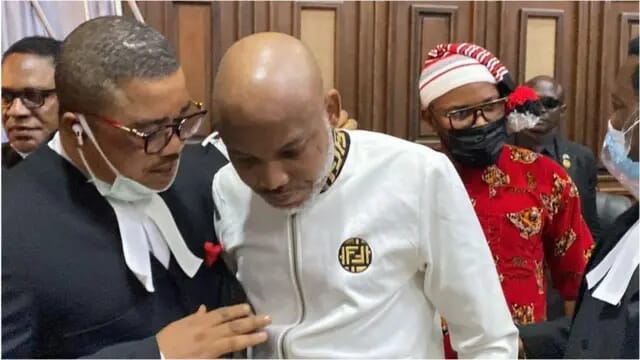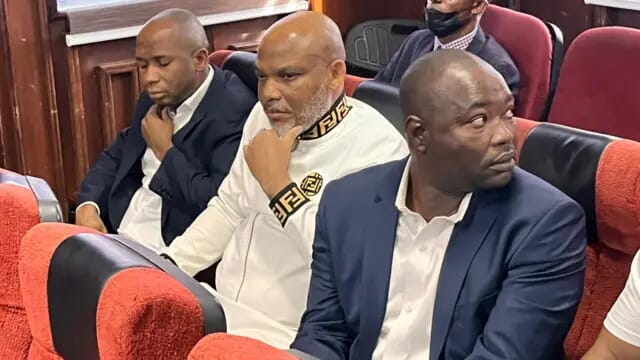In a stunning development that has sent shockwaves through Nigeria's legal and political landscape, Nnamdi Kanu, the detained leader of the Indigenous People of Biafra (IPOB), has sacked his entire legal team during a court appearance on October 23, 2025. This bold decision comes as Kanu prepares to defend himself against terrorism charges that have kept him in custody for years. As reasons for this drastic step emerge, it raises questions about the fairness of his trial and the broader implications for separatist movements in Nigeria.
The Federal High Court in Abuja was the scene of high drama when Kanu's lead counsel, Godwin Kanu Agabi, a former Attorney-General of the Federation, informed the presiding judge, James Omotosho, that his client no longer required their services. Kanu, appearing from the dock, confirmed this, stating he was ready to represent himself "for now," though he left open the possibility of reconsidering later. This move led to the immediate withdrawal of all senior advocates from the case, leaving Kanu to navigate the complex legal waters alone.
Nnamdi Kanu Sacking Legal Team Reasons: Jurisdiction Challenges at the Forefront
One of the primary reasons emerging for Kanu's decision to sack his legal team is his desire to personally challenge the court's jurisdiction over his case. Kanu has repeatedly argued that the Federal Government is in contempt of a 2022 Court of Appeal judgment that discharged and acquitted him. Despite this ruling, he remains detained, a situation he describes as a blatant violation of judicial orders. By taking control of his defense, Kanu aims to highlight this issue directly, accusing the government of defying higher court decisions.
Kanu's frustration stems from what he perceives as ongoing injustices. He claims the terrorism law under which he is being tried has been repealed, rendering the charges invalid. Additionally, he alleges that a medical report declaring him fit for trial was forged, dated before the court even ordered the evaluation. These points, Kanu believes, have not been adequately addressed by his previous lawyers, prompting him to step in personally to ensure they are brought to light.
This is not the first time Kanu has raised objections to the trial's legitimacy. His case has seen multiple judges, appeals, and twists, including a Supreme Court decision in December 2023 that overturned the Court of Appeal's acquittal and allowed the trial to continue. Kanu's move to self-represent could be a strategic gamble to force a reevaluation of these foundational issues.
IPOB Leader Nnamdi Kanu Trial Updates: Denied Fair Hearing and Access Issues
Another key reason for sacking his legal team appears to be Kanu's complaint of denied fair hearing. He has accused the Department of State Services (DSS) of restricting his access to lawyers for over four years, hampering his ability to prepare a proper defense. This lack of access, combined with what he calls inadequate preparation time, has fueled his dissatisfaction with the legal process.
During the October 23 hearing, Kanu requested more time to assemble witnesses and prepare his case, emphasizing the capital nature of the seven-count charges against him, which include treason, incitement, and unlawful broadcasting. The judge, however, ruled that new preliminary objections could not be entertained at this stage, advising Kanu to include them in his final address. This ruling may have further solidified Kanu's resolve to handle the matter himself.
The prosecution, led by Adegboyega Awomolo, dismissed Kanu's submissions as attempts to delay the trial. Yet, Kanu's actions underscore a deeper mistrust in the system, reflecting broader concerns about judicial independence in politically sensitive cases.
Reasons Nnamdi Kanu Fired Lawyers: Background and Historical Context
To understand the full context, it's essential to revisit Kanu's tumultuous legal journey. Arrested in 2015 for his broadcasts advocating Biafran secession, Kanu was granted bail in 2017 but fled after a military raid on his home. Rearrested in Kenya in 2021 and extradited to Nigeria a process the Court of Appeal later deemed illegal Kanu has been in DSS custody ever since.
The 2022 appellate discharge was a momentary victory, but the Supreme Court's reversal allowed the use of evidence obtained through his controversial rendition. Kanu's trial has involved four judges and multiple defense teams, with this latest sacking adding to the saga's complexity.
Just days before the hearing, on October 21, Kanu filed a motion listing high-profile witnesses, including former officials like Abubakar Malami, Nyesom Wike, and military leaders. This list suggests Kanu intends to broaden the scope of his defense, potentially exposing alleged government misconduct.
Nnamdi Kanu Self-Representation Implications: What Happens Next?
Kanu's decision to defend himself has immediate implications. The court has ordered him to open his defense on October 24, 2025, warning that failure to do so could mean waiving his right. Self-representation in a high-stakes terrorism trial is risky, given the legal intricacies involved. However, it allows Kanu to voice his grievances unfiltered, potentially galvanizing his supporters.
IPOB and its sympathizers have long argued that Kanu's prosecution is politically motivated, aimed at suppressing Biafran aspirations. Recent protests, including one led by Omoyele Sowore calling for Kanu's release, highlight the case's ongoing volatility.
Legal experts note that while self-representation is a constitutional right, it often disadvantages defendants in complex cases. Kanu's former lawyers have spoken out post-disengagement, expressing surprise but respecting his choice.
IPOB Nnamdi Kanu Latest News: Broader Political Ramifications
This development could delay the trial further, already marked by numerous adjournments. It also spotlights issues of human rights, rendition, and judicial fairness in Nigeria. International observers have criticized Kanu's extradition, and his continued detention despite health concerns adds fuel to the debate.
For IPOB, Kanu's move reinforces his image as a defiant leader fighting against perceived oppression. Supporters view it as a stand against a biased system, while critics see it as a tactic to prolong proceedings.
As the trial resumes tomorrow, all eyes are on Kanu. Will he succeed in challenging the charges, or will this self-representation backfire? The answers could reshape Nigeria's approach to separatist issues.
In conclusion, the reasons for Nnamdi Kanu sacking his legal team revolve around deep-seated frustrations with the judicial process, including jurisdiction disputes, fair hearing denials, and access restrictions. This dramatic turn underscores the high stakes in one of Nigeria's most contentious legal battles.
Read More
- How Joy Ogah Became Nigeria's Vice President for a Day: A Beacon of Hope for Girl-Child Education
- Kidnapped Aisha Wahab's ₦20 Million Ransom Plea in Viral Video Sparks Outrage
- Nigeria's Push for Global Stablecoin Leadership: CBN Takes Center Stage
- Can't Run a POS Business If You Owe Bank Loans? Breaking Down the New CBN Rules
- Top 10 Nigerian Stocks Delivering Massive Investor Returns in Q3 2025

